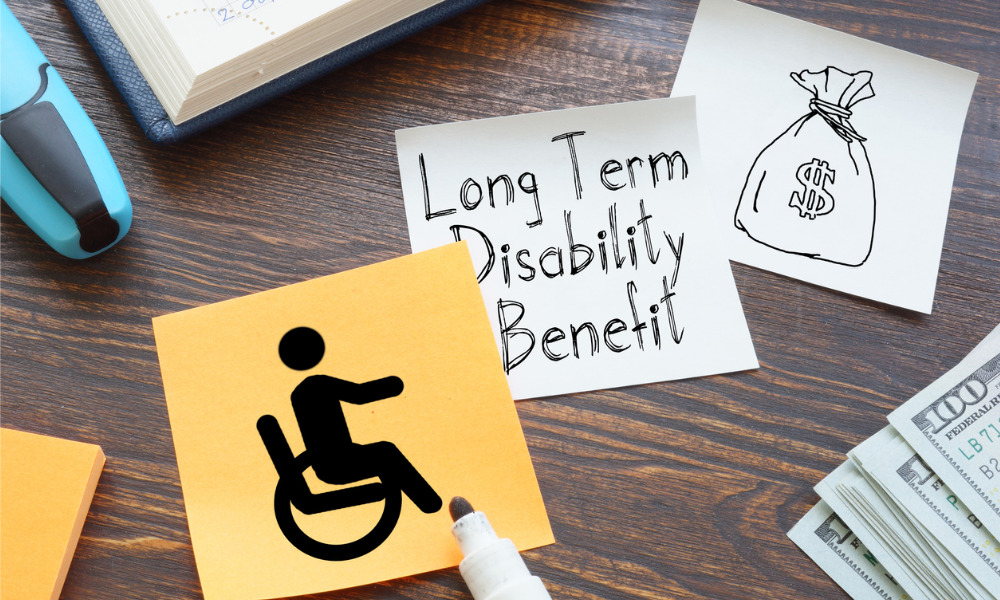- What are long-term disability benefits in Canada?
- How much does long-term disability pay in Canada?
- Can you collect long-term disability benefits and CPP disability benefits at the same time?
- Can I earn money while on long-term disability benefits in Canada?
- Are long-term disability benefits taxable?
- How are long-term disability payments calculated?
Employees are important assets for employers and their businesses. But when an employee is unable to work for a period of time due to a disability or a sickness, what would be their benefits under the law? Long-term disability benefits can provide some relief during these hard times in an employee’s life.
What are long-term disability benefits in Canada?
Long-term disability benefits are insurance plans that substitute a part of the salary or income of an employee, when they are unable to work after becoming disabled. The disability may be a result of an injury, an accident, or a sickness. This may happen whether the employee was in the workplace or not.
These insurance plans may be offered by a private insurance company or by a government program. Insurance premiums may be paid by the employees and/or the employers.
Canadian laws on long-term disability benefits
Long-term disability benefits in Canada are governed by a combination of federal and provincial/territorial laws and programs on disability benefits or pension plans. Disputes arising out of these insurance plans will be governed by Canada’s common law on contracts and insurance policies.
Some federal laws regarding long-term disability benefits include the Canada Pension Plan (CPP), the Disability Tax Credit program, and the Government Employees Compensation Act (GECA).
Certain Canadian provinces have also enacted their own laws covering disability benefits for employees.
Ontario has enacted the Ontario Disability Support Program Act (ODSP). British Columbia has the Long Term Disability Plan Regulation. Québec has its Pension Plan in lieu of the CPP.
Qualifications for long-term disability benefits
Employees, or insurance policyholders, must check with their employers and their insurance policy provider on how they can qualify for long-term disability benefits.
It may depend on certain factors, such as:
- the sickness or disability covered by the insurance policy
- the amount of insurance premiums that the employee and/or employer has/have paid
- any other terms and conditions set in the insurance policy
Federal government employees in Canada may be eligible for the Federal Workers' Compensation Service under the GECA. This applies if they work in federal departments or agencies, in any Crown corporation, or in any other designated government offices.
Private sector employees or self-employed people may be eligible under CPP disability benefits. Certain conditions apply. They should be under 65 years old and they should have made contributions to the CPP:
- in 4 of the last 6 years; or
- for at least 25 years, including 3 of the last 6 years; or
- is eligible under the “late applicant provision” of the Canada Pension Plan.
1/ New! Eligible CPP recipients who qualify for the child-rearing drop-in (CRDI) provision or the disability drop-in (DDI) provision may receive a slight increase in their monthly benefit amounts starting in June 2023. pic.twitter.com/H0OXJAR21X
— Service Canada (@ServiceCanada_E) July 18, 2023
How much does long-term disability pay in Canada?
Income replacements under long-term disability benefits in Canada may range from 60%-70% of an employee’s average salary. But this depends on the insurance policy or the disability plan that the policyholder is eligible for. Employees must consult with their employers and their insurance provider on the specific computation of their long-term disability benefits.
As an example, the current maximum monthly payment for disability benefits under the CPP is C$1,538.67.
Can you collect long-term disability benefits and CPP disability benefits at the same time?
There are instances when a policyholder of a private long-term disability plan also receives CPP disability benefits or provincial/territorial disability benefits. In this situation, insurance companies may deduct the actual or estimated amount of the CPP or provincial/territorial disability benefits from the amount it will pay to the policyholder.
Again, this will depend on the insurance policy where the employee is enrolled at. However, this set-up will not prevent an employee from receiving disability benefits from the CPP.
Can I earn money while on long-term disability benefits in Canada?
Employees may still work other jobs if they are on an own occupation or any occupation insurance policy. They will have to check with their employer and their insurance company if such an arrangement is allowed.
Working or becoming self-employed while receiving CPP disability benefits come with certain conditions.
First, employees must inform Service Canada that they will be working while receiving disability benefits.
Second, the benefits will be affected by the amount of income that the disabled employee will be receiving:
- below C$6,600 (before tax): will not affect the CPP disability benefits
- between C$6,600 and C$18,508.36 (before tax): may affect (or reduce) the CPP disability benefits
- above C$18,508.36 (before tax): will disqualify the employee from the CPP disability benefits
Are long-term disability benefits taxable?
Whether the long-term disability benefits are taxable or not depends on the insurance policy. It will also depend on whether the insurance premiums are solely paid by a self-employed individual or by the employer.
When an employee does not have to pay taxes for the insurance premiums that their employer has paid, the long-term disability benefits will become taxable when received by the employee.
Government insurance plans also vary when it comes to taxes. For example, while CPP disability benefits are taxable, Ontario’s ODSP is non-taxable.
Disabled employees may apply for a Disability Tax Credit (DTC) to reduce their income taxes upon certification by a medical practitioner.
In addition, CPP pensioners may send a Request for Voluntary Federal Income Tax Deductions to Service Canada. They can also apply for a Working Income Tax Benefit (WITB).
How are long-term disability payments calculated?
For private insurance holders, the monthly payments of the long-term disability benefits are calculated based on the terms and conditions of the insurance policy. An agreed percentage of the gross income will be its base pay, subject to certain deductions, such as taxes for certain scenarios.
Other compensation from the employer will not be included in the long-term disability payment calculations. Examples of these compensations are overtime pay, bonuses, or commissions.
Got more questions? Contact one of the Lexpert's top-ranked long-term disability lawyers for more information.





